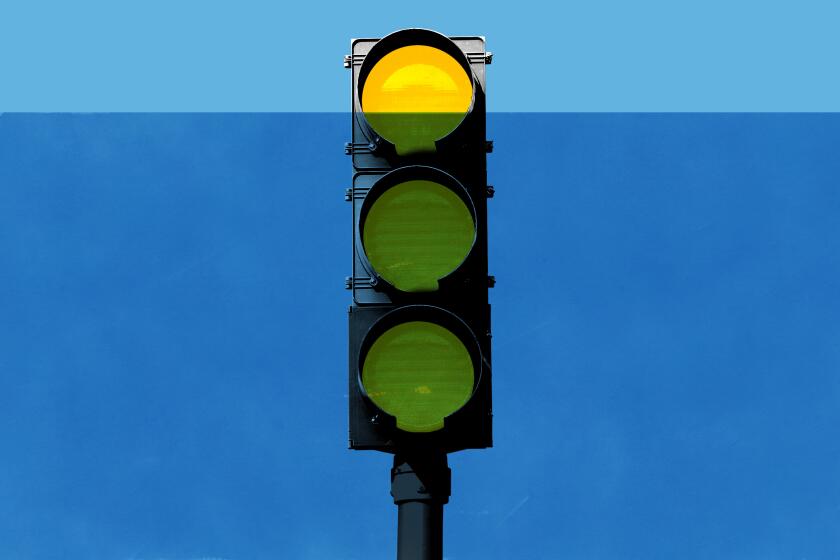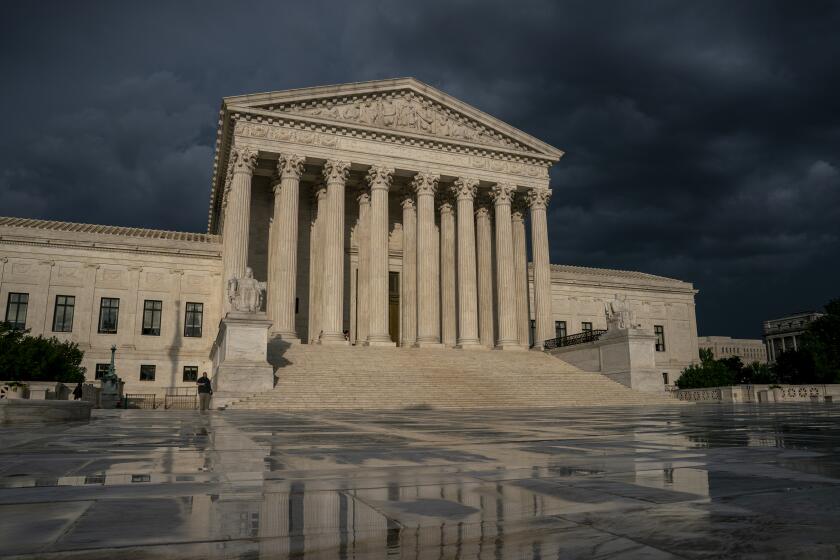Column: Is democracy failing? Xi Jinping says it is, and he’s not entirely wrong

- Share via
President Biden likes to say that we are locked in a global battle pitting democracy against autocracy.
In Seattle last week, he described a phone conversation he’d had with Xi Jinping in which the Chinese leader argued that democracy doesn’t work anymore. Among other things, Xi said, democracy requires consensus, and mustering a consensus takes too long in a fast-moving world. Only autocracies are equipped to meet the extraordinary challenges of modern times.
Biden, as he does every time he tells the story, dismissed the idea that democracy is passé or unworkable.
But I’ve begun to wonder whether Xi might be onto something.
Opinion Columnist
Nicholas Goldberg
Nicholas Goldberg served 11 years as editor of the editorial page and is a former editor of the Op-Ed page and Sunday Opinion section.
We Americans often treat our liberal democracy as a national religion, and routinely assert, as if no evidence were needed, that it is the most moral, just, effective and admirable system on Earth.
But few would deny that there’s been some disturbing evidence to the contrary in recent years.
The Jan. 6 riot, of course, was a low point. Then there was the chaotic, inefficient, politicized response to the pandemic. The continuing legislative paralysis in Washington.
The strongest evidence of democracy’s weakness, however, has got to be the tepid U.S. response to climate change over the last 25 years.
An epochal, Earth-threatening catastrophe is barreling toward us, poised to upend life as we know it. As one of the world’s wealthiest countries and greatest historic emitters of carbon, we obviously should be leading an urgent and aggressive charge to protect the planet. But we’re not.
Did you skip it? The United Nations’ climate change panel just delivered more proof of our stubborn, catastrophic climate passivity.
Why have we failed to rise to the occasion? One obvious reason is that our system allows the oil and gas industry to wield grossly disproportionate power — thanks to the way money distorts our politics. The top 10 fossil fuel industry contributors alone gave $60 million to candidates in the 2019-2020 election cycle.
Another reason is that in a democracy, elected officials have no incentive to support policies that require pain and sacrifice today in exchange for future gain. Pay twice as much for gas? Don’t drive? Don’t fly? In most cases, courageous politicians who supported such policies would be voted out of office.
What’s more, too many Americans believe the climate crisis is terribly exaggerated, despite a scientific consensus that it’s not. This anti-intellectual strain has always existed in American political culture, but the number of science-skeptical voters seems to have grown during the Trump years.
I mention climate change just as an example. It is just one small part of what ails our democratic system these days.
The lexicon of delay uses “adaptation,” “resilience,” “geoengineering” and “carbon capture” to promise action, but they all fail to address the scale of the problem.
Even post-Trump, we face a deep, bitter, partisan polarization. A dysfunctional Congress. An ongoing effort to undermine the 2020 election. An assault on voting rights.
Add to that a host of long-standing structural problems.
A U.S. Senate in which tiny states like Wyoming, with 582,000 people, have the same representation and voting power as big states like California, with 39 million people.
A system that allows congressional district lines to be manipulated for partisan advantage.
Campaign finance laws that let mega-rich Americans and giant corporations spend unlimited amounts to influence elections.
An anachronistic electoral college and filibuster rules that are undermining the notion of majority rule.
And good luck fixing these problems. Making reforms and passing laws in a country this divided is extremely difficult, and amending the Constitution is nearly impossible. A newly empowered conservative Supreme Court won’t make it easier.
The court’s majority is poised to reshape constitutional rights and protections in ways this nation has not seen in generations.
In recent years, Freedom House, which rates and ranks democracies around the world, has downgraded the U.S. so that it now ranks close to Panama and Romania, and 10 points below “traditional peers” such as the United Kingdom and Germany.
And it’s true that the United States has never lived up to its own lofty ideals. Liberty, equality, fairness, the evenhanded rule of law — these are aspirations, not yet achievements.
Given all this, is it any surprise that Xi and many others believe our system is dysfunctional?
But here’s the flip side: Despite democracy’s glaring flaws, autocracy isn’t the answer. Those who see hope in the Orbans, the Le Pens and the Trumps, much less in the Xis and Putins, should think again.
Freedom House, for the record, says China is “increasingly repressive” and is “tightening control over all aspects of life.” Describing Russia, Freedom House refers to “loyalist security forces, a subservient judiciary, a controlled media environment, and a legislature consisting of a ruling party and pliable opposition factions.”
These are not the conditions under which most people would choose to live. But beyond that, there’s no evidence — despite Xi’s assertions — that China or any other autocratic country has a much better track record on addressing climate change or solving its domestic problems.
“The problems attributed to democracy, particularly regarding crises like climate change, are real and worthy of concern — I lose sleep over them,” says Steven Levitsky, a professor of government at Harvard and co-author of “How Democracies Die.” “But the fact that democracies are bad at responding to serious challenges that require either rapid decision-making or long-term thinking does not mean autocracies are any better.”
President Biden convenes leaders from over 100 countries to fortify democratic ideals and ambitions, even amid anti-democratic movements in the U.S.
Levitsky says that history is littered with disastrous authoritarian experiments and that Xi is not the first to claim his authoritarian system is better than democracy. The Soviets and the fascists said the same.
The unsatisfying reality is that democracy is difficult work. Americans need to fix the Senate. Disentangle money and campaigns. Ban gerrymandering. Restore democratic norms.
To do so, citizens must understand the issues, vote their consciences, agitate for change — and act cooperatively, even with opponents.
We have a long distance to go (and with regard to climate change, very little time).
But democracy is a long-term project. It doesn’t come wrapped in bright colors with a bow around it. You’ve got to fight for it.
More to Read
A cure for the common opinion
Get thought-provoking perspectives with our weekly newsletter.
You may occasionally receive promotional content from the Los Angeles Times.
















